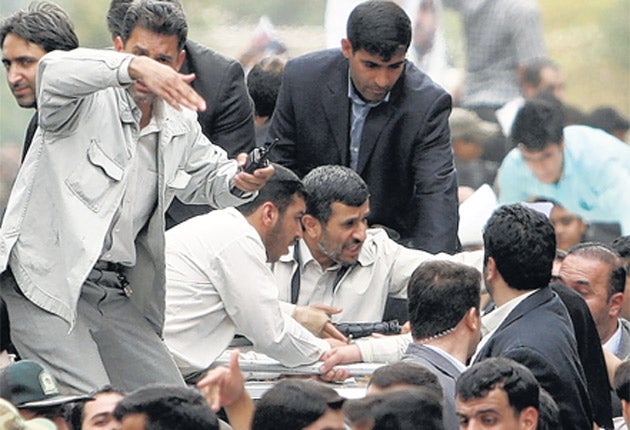Assassination attempt? No, just an overexcited supporter, says Iran

Your support helps us to tell the story
From reproductive rights to climate change to Big Tech, The Independent is on the ground when the story is developing. Whether it's investigating the financials of Elon Musk's pro-Trump PAC or producing our latest documentary, 'The A Word', which shines a light on the American women fighting for reproductive rights, we know how important it is to parse out the facts from the messaging.
At such a critical moment in US history, we need reporters on the ground. Your donation allows us to keep sending journalists to speak to both sides of the story.
The Independent is trusted by Americans across the entire political spectrum. And unlike many other quality news outlets, we choose not to lock Americans out of our reporting and analysis with paywalls. We believe quality journalism should be available to everyone, paid for by those who can afford it.
Your support makes all the difference.Mystery persisted last night over a purported attack on Mahmoud Ahmadinejad, though the Iranian authorities maintained the incident was no more than an over-enthusiastic supporter throwing a firecracker in the President's general direction.
The confusion began when Khabar Online, a conservative Iranian website, reported that a homemade grenade had exploded close to President Ahmadinejad's motorcade during a visit to the city of Hamedan, 250 miles south-west of the capital Tehran. In initial comments to Western news agencies, Iran officials also seemed to indicate that an attack had taken place, saying one person had already been arrested. But that version changed later, as state television and the official IRNA news agency insisted that a young fan of Mr Ahmadinejad was merely letting off steam. The explosion had caused "a lot of smoke," witnesses said, but no one had been hurt, least of all the President, who was 100 yards away at the time.
According to IRNA, "an excited young man from Hamadan exploded a firecracker in order to express his happiness. It did not cause any disturbance among the crowd, which was giving a warm welcome to the President."
Instead, the agency pinned the blame on a familiar scapegoat, the foreign media, elements of which had "tried to take advantage of this event, in line with their goals". For their part, Iranian exile groups said they knew nothing of any planned attack.
Mr Ahmadinejad claimed on Monday that he is the target of an assassination plot by Israel. "The stupid Zionists have hired mercenaries to assassinate me," he told a gathering of Iranian expatriates. In fact, during the five years the former transport engineer has been President, reports of such attempts against him have been virtually non-existent, despite the mass protest that surrounded his disputed re-election in June 2009. Discontent with the President has continued, not least because of the struggling national economy – but, if anything, visits to the provinces have been an effective means of shoring up his support.
In any event, an unharmed Mr Ahmadinejad went to Hamedan's main stadium to give his speech as planned, live on state television. He made no mention of the attack, focusing instead on the country's controversial nuclear programme. As usual, he was defiant in the face of Western demands that Iran halt its uranium enrichment activities, which the US and its allies say are aimed at building a nuclear weapon.
The West would be making "a big mistake", he declared, if it thought that by "resorting to lies and hue and cry" it could extract concessions from the Islamic regime. The speech came days after the Iranian leader offered to meet President Obama, with no pre-conditions, when he attends the United Nations General Assembly in New York next month.
Despite various gestures towards Tehran, the Obama administration has turned down similar offers from Mr Ahmadinejad in the past, and is likely to do so again. Indeed, the mysterious "attack" came on the same day the US moved to tighten sanctions on Iranian organisations it accuses of sponsoring terrorism – notably the Revolutionary Guards and its Quds Force unit, believed to be a prime backer of the Lebanese Hezbollah group and the Palestinian Hamas movement – or of lending support to the Taliban in Afghanistan.
The US Treasury measure also targeted two named social services organisations for providing financial, material and technological support to Hezbollah.
According to the Treasury, the latest measures could be especially painful for the regime, which is "increasingly dependent on the Revolutionary Guard both for its political hold on power and for economic reasons.
The Iranian leadership, it said, was increasingly directing single-source contracts to the organisation for major infrastructure projects, including oil and gas fields development. Thus the Revolutionary Guard was gradually "assuming control over vast swathes of the Iranian economy."
Amid the continuing deadlock over Iran's nuclear activities, speculation continues that Israel or the US will take military action to destroy key nuclear plants. But that may have just become more difficult, if Iran's boast yesterday that it had obtained four Russian-built S-300 surface-to-air missile systems is true.
The Fars news agency, with close ties to the Revolutionary Guard, said two S-300s had come from Belarus and two others from elsewhere. In 2007 Moscow signed a contract to deliver the S-300 systems, but so far it has not delivered them, partly because of strong objections from the US.
Join our commenting forum
Join thought-provoking conversations, follow other Independent readers and see their replies
Comments